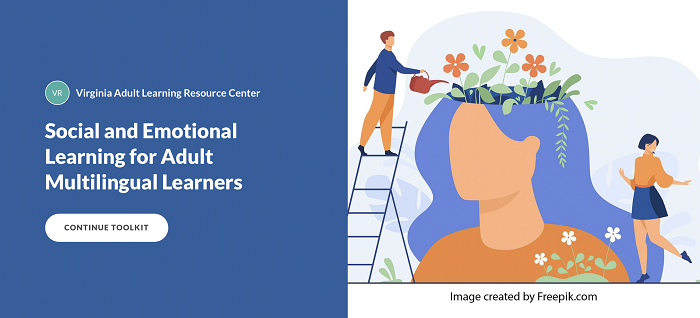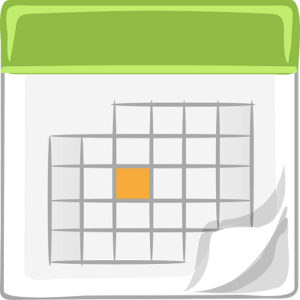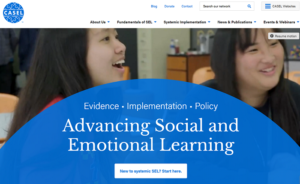- MN ABE Connect
- Archive
- A Social-Emotional Learning Resource Developed Just for Adult Learners
 April 10, 2023
April 10, 2023
A Social-Emotional Learning Resource Developed Just for Adult Learners
Stephanie Sommers, ACES CoordinatorOne thing that I appreciate about a resource is when you get to know both the why and the how. When I find these two pieces of information together in a single resource, I know that it’s going to be useful. Understanding the research and science behind a best practice helps us as educators know why it is beneficial to our learners. Knowing this information, however, is not enough. We also have to know how to implement the best practice through the use of strategies and learning activities.
Best practice: Social and Emotional Learning
One best practice that I have recently been researching is incorporating Social and Emotional Learning (SEL) into Adult Education. Social and Emotional Learning is an area of special focus for the work we have been doing to update ACES/TIF, and it has many connections to our transitions skills framework. While the Transitions Integration Framework (TIF) highlights six areas of skill development for adult learners, SEL is often described as having five key competencies:
These areas are defined and explained by the Collaborative for Academic, Social, and Emotional Learning (CASEL), which is an excellent source for all things SEL.
SEL for adult learners
While CASEL is undoubtedly an expert source for learning about SEL, the work that they do focuses on young people and creating better K-12 schools and communities in which they can thrive. I wanted a resource for our adult learners, for whom these skills are every bit as important. For that, I have turned to the Social and Emotional Learning for Adult Multilingual Learners Toolkit, which was developed by the Virginia Adult Learning Resource Center (VALRC).
According to the toolkit’s homepage the resource was created to, “offer explanations, tips, materials, and links to help ESOL teachers and programs better understand and integrate social-emotional learning into the adult English language classroom.”
 Section 3 of Toolkit: How does SEL connect with adult learning and multilingual learner instruction?
Section 3 of Toolkit: How does SEL connect with adult learning and multilingual learner instruction?
There are five sections in the toolkit, and one that I found especially useful outlines how some of the strategies that we already know to be highly effective when working with adult learners also support SEL. In fact, their connection to Social and Emotional Learning is probably how they were first identified as best practices. These strategies include creating a cooperative classroom environment, knowing your learners in order to draw on their strengths, and utilizing self-directed learning.
As an ABE teacher, it was validating to learn how many of the things that I already do with my adult learners, such as providing choice and opportunities for self-assessment, also foster SEL.
Section 4 of Toolkit: Social and Emotional Learning Activities for Adult Multilingual Learners
Another area of the toolkit that is very helpful is the section that focuses on SEL learning activities. According to the website, “This section of the toolkit is a guide for integrating emotional check-ins, growth mindset prompts, empathy task cards, and mindfulness activities into the adult education classroom. Each section provides implementation strategies, presentation strategies, scaffolds, and pre-teaching materials.”
I have long been a devotee of growth mindset, and I enjoyed reading through the mindset prompts that were included in the toolkit. Another interesting learning task from the toolkit is the empathy task cards. These cards present situations that are very relevant to adults, such as thinking about what to say to a coworker who has just experienced a loss or what to say to someone who has just been given a promotion. As many of these situations have a strong cultural connection, it would be a rich learning activity to have students discuss what constitutes appropriate responses in our culture and share what is appropriate in theirs.
Learn more about SEL
Just as we understand that our adult learners need transitions skills in order to be successful in all areas of their lives, we also understand that being an adult educator means nurturing the whole person: body, mind, and spirit. We recognize that adults need to understand and take care of their emotional health in order to be successful and reach their goals, and this is what SEL is all about.
 To learn more about this topic, please join us for our third and final “TIFty Tuesday” webinar on April 18, 2023 from 1:30-3:00. Dr. Jamie Kreil will be my special guest, and we will share ideas for ways to support SEL while also incorporating ACES/TIF in your instruction.
To learn more about this topic, please join us for our third and final “TIFty Tuesday” webinar on April 18, 2023 from 1:30-3:00. Dr. Jamie Kreil will be my special guest, and we will share ideas for ways to support SEL while also incorporating ACES/TIF in your instruction.
If you missed our previous TIFty Tuesday webinars on routines and creating more diverse and equitable ABE classrooms, the recordings can be found in the ACES playlist on the MN Adult Education PD YouTube channel (http://tinyurl.com/mnabepd).
Newsletter Signup
Get MN ABE Connect—the official source for ABE events, activities, and resources!
Sign UpArticle Categories
- ABE Foundations/Staff Onboarding
- ACES/Transitions
- Adult Career Pathways
- Assessment
- CCR Standards
- Citizenship
- COVID-19
- Cultural Competency
- Digital Literacy/Northstar
- Disabilities
- Distance Learning/Education
- ELA
- Equity/Inclusion
- ESL
- HSE/Adult Diploma
- Listening
- Math/Numeracy
- Mental Health
- Minnesota ABE
- One-Room Schoolhouse/Multilevel
- Professional Development
- Program Management
- Reading
- Remote Instruction
- Science
- Social Studies
- Speaking/Conversation
- Support Services
- Teaching Strategies
- Technology
- Uncategorized
- Volunteers/Tutors
- Writing
